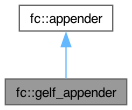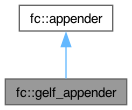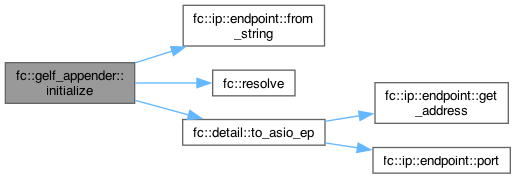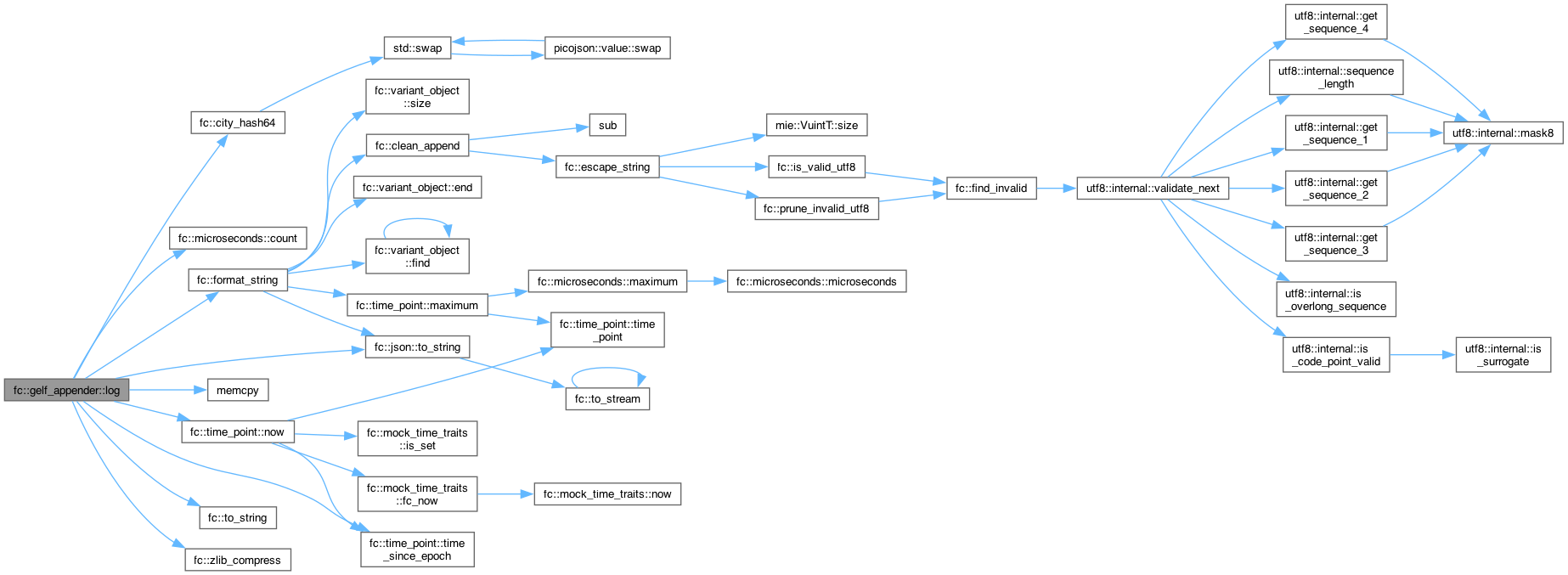Loading...
Searching...
No Matches
fc::gelf_appender Class Referencefinal
#include <gelf_appender.hpp>
Inheritance diagram for fc::gelf_appender:

Collaboration diagram for fc::gelf_appender:

Classes | |
| struct | config |
| class | impl |
Public Member Functions | |
| gelf_appender (const variant &args) | |
| ~gelf_appender () | |
| void | initialize (boost::asio::io_service &io_service) override |
| Required for name resolution and socket initialization. | |
| virtual void | log (const log_message &m) override |
 Public Member Functions inherited from fc::appender Public Member Functions inherited from fc::appender | |
Additional Inherited Members | |
 Public Types inherited from fc::appender Public Types inherited from fc::appender | |
| typedef std::shared_ptr< appender > | ptr |
Detailed Description
Definition at line 13 of file gelf_appender.hpp.
Constructor & Destructor Documentation
◆ gelf_appender()
| fc::gelf_appender::gelf_appender | ( | const variant & | args | ) |
Definition at line 79 of file gelf_appender.cpp.
79 :
80 my(new impl(args))
81 {
82 }
◆ ~gelf_appender()
| fc::gelf_appender::~gelf_appender | ( | ) |
Definition at line 131 of file gelf_appender.cpp.
132 {}
Member Function Documentation
◆ initialize()
|
overridevirtual |
- Warning
- If this method is not called, this appender will log nothing.
In a single-threaded world with a boost::io_service that's not owned by this library, ugly things are required. Tough.
Implements fc::appender.
Definition at line 84 of file gelf_appender.cpp.
85 {
86 try
87 {
88 try
89 {
90 // if it's a numeric address:port, this will parse it
92 }
93 catch (...)
94 {
95 }
96 if (!my->gelf_endpoint)
97 {
98 // couldn't parse as a numeric ip address, try resolving as a DNS name.
99 // This can yield, so don't do it in the catch block above
100 string::size_type colon_pos = my->cfg.endpoint.find(':');
101 try
102 {
103 uint16_t port = boost::lexical_cast<uint16_t>(my->cfg.endpoint.substr(colon_pos + 1, my->cfg.endpoint.size()));
104
105 string hostname = my->cfg.endpoint.substr( 0, colon_pos );
107 if (endpoints.empty())
108 FC_THROW_EXCEPTION(unknown_host_exception, "The logging destination host name can not be resolved: ${hostname}",
109 ("hostname", hostname));
110 my->gelf_endpoint = endpoints.back();
111 }
112 catch (const boost::bad_lexical_cast&)
113 {
114 FC_THROW("Bad port: ${port}", ("port", my->cfg.endpoint.substr(colon_pos + 1, my->cfg.endpoint.size())));
115 }
116 }
117
118 if (my->gelf_endpoint)
119 {
120 my->gelf_socket.initialize(io_service);
121 my->gelf_socket.open();
122 std::cerr << "opened GELF socket to endpoint " << my->cfg.endpoint << "\n";
123 }
124 }
125 catch (...)
126 {
127 std::cerr << "error opening GELF socket to endpoint " << my->cfg.endpoint << "\n";
128 }
129 }
boost::asio::ip::udp::endpoint to_asio_ep(const fc::ip::endpoint &e)
Definition gelf_appender.cpp:23
std::vector< boost::asio::ip::udp::endpoint > resolve(boost::asio::io_service &io_service, const std::string &host, uint16_t port)
Definition resolve.cpp:6
Here is the call graph for this function:

◆ log()
|
overridevirtual |
Implements fc::appender.
Definition at line 134 of file gelf_appender.cpp.
135 {
136 if (!my->gelf_endpoint)
137 return;
138
139 log_context context = message.get_context();
140
141 mutable_variant_object gelf_message;
142 gelf_message["version"] = "1.1";
143 gelf_message["host"] = my->cfg.host;
145
146 // use now() instead of context.get_timestamp() because log_message construction can include user provided long running calls
148 gelf_message["timestamp"] = time_ns / 1000000.;
149 gelf_message["_timestamp_ns"] = time_ns;
150
153
155 {
157 gelf_message["level"] = 7; // debug
158 break;
160 gelf_message["level"] = 6; // info
161 break;
163 gelf_message["level"] = 4; // warning
164 break;
166 gelf_message["level"] = 3; // error
167 break;
170 // these shouldn't be used in log messages, but do something deterministic just in case
171 gelf_message["level"] = 6; // info
172 break;
173 }
174
183
186 }
187
191 gelf_message_as_string = zlib_compress(gelf_message_as_string);
192
193 // packets are sent by UDP, and they tend to disappear if they
194 // get too large. It's hard to find any solid numbers on how
195 // large they can be before they get dropped -- datagrams can
196 // be up to 64k, but anything over 512 is not guaranteed.
197 // You can play with this number, intermediate values like
198 // 1400 and 8100 are likely to work on most intranets.
199 const unsigned max_payload_size = 512;
200
201 if (gelf_message_as_string.size() <= max_payload_size)
202 {
203 // no need to split
204 std::shared_ptr<char> send_buffer(new char[gelf_message_as_string.size()],
206 memcpy(send_buffer.get(), gelf_message_as_string.c_str(),
207 gelf_message_as_string.size());
208
209 my->gelf_socket.send_to(send_buffer, gelf_message_as_string.size(),
210 *my->gelf_endpoint);
211 }
212 else
213 {
214 // split the message
215 // we need to generate an 8-byte ID for this message.
216 // city hash should do
217 uint64_t message_id = city_hash64(gelf_message_as_string.c_str(), gelf_message_as_string.size());
218 const unsigned header_length = 2 /* magic */ + 8 /* msg id */ + 1 /* seq */ + 1 /* count */;
219 const unsigned body_length = max_payload_size - header_length;
220 unsigned total_number_of_packets = (gelf_message_as_string.size() + body_length - 1) / body_length;
221 unsigned bytes_sent = 0;
222 unsigned number_of_packets_sent = 0;
223 while (bytes_sent < gelf_message_as_string.size())
224 {
225 unsigned bytes_to_send = std::min((unsigned)gelf_message_as_string.size() - bytes_sent,
226 body_length);
227
228 std::shared_ptr<char> send_buffer(new char[max_payload_size],
231 // magic number for chunked message
234
235 // message id
238
242 bytes_to_send);
243 my->gelf_socket.send_to(send_buffer, header_length + bytes_to_send,
244 *my->gelf_endpoint);
245 ++number_of_packets_sent;
246 bytes_sent += bytes_to_send;
247 }
248 FC_ASSERT(number_of_packets_sent == total_number_of_packets);
249 }
250 }
static constexpr fc::microseconds format_time_limit
Definition exception.hpp:60
static string to_string(const variant &v, const yield_function_t &yield, const output_formatting format=output_formatting::stringify_large_ints_and_doubles)
Definition json.cpp:674
@ legacy_generator
constexpr const microseconds & time_since_epoch() const
Definition time.hpp:52
#define FC_ASSERT(TEST,...)
Checks a condition and throws an assert_exception if the test is FALSE.
Definition exception.hpp:362
fc::string format_string(const fc::string &, const variant_object &, bool minimize=false)
Definition variant.cpp:773
Definition yubihsm_winhttp.c:52
memcpy((char *) pInfo->slotDescription, s, l)
Here is the call graph for this function:

The documentation for this class was generated from the following files:
- libraries/fc/include/fc/log/gelf_appender.hpp
- libraries/fc/src/log/gelf_appender.cpp